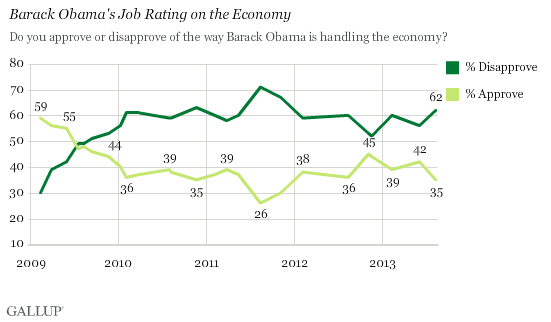The news from Gallup cannot be buoying the president in yet another summer swoon. Approval of his economic performance is back to near 2011 levels:
 How to account for this, when the economy is actually growing again, and when the US recovery has been more powerful than any other developed country? I’d say a few things: the simple fact that he cannot truly execute his economic policy as long as the GOP controls the House and blocks new infrastructure spending and mandates a sequester that has both cut the deficit but also dampened growth; the lack of good new jobs for vast swathes of the middle class stranded after the banking crisis (hence the sharp decline in white working-class support); and the anemic level of growth that has done little to recoup the huge losses of the recession.
How to account for this, when the economy is actually growing again, and when the US recovery has been more powerful than any other developed country? I’d say a few things: the simple fact that he cannot truly execute his economic policy as long as the GOP controls the House and blocks new infrastructure spending and mandates a sequester that has both cut the deficit but also dampened growth; the lack of good new jobs for vast swathes of the middle class stranded after the banking crisis (hence the sharp decline in white working-class support); and the anemic level of growth that has done little to recoup the huge losses of the recession.
Voters gave Obama enough time to get things back on track, and they’re not happy with the track. And why should they be? Obama can say the Congress and state governments have foiled him – but, in the end, the GOP’s cynical strategy appears to be working: sabotage the economy so Obama gets all the blame, and cling on to whiter and whiter districts to keep the obstruction going, and keep growth low. That the GOP’s alternative economic plans are either Randian dreams or austerity-on-steroids does not matter as long as they are not in power. Oppositionism is all they need for now.
But there are long-term reasons why this assessment may be far too gloomy. Growth is accelerating somewhat; the deficit is falling fast; unemployment looks set to fall still further. The GOP may well blow its cynical strategy and favor a showdown over spending with Obama this fall. The result of that epic shoot-out will probably shift the political climate more powerfully than any poll can indicate now. But at some point, in any case, if the GOP seems set on governing, its own alternatives will rise to the surface. We saw what happened to Paul Ryan’s budget once it had to be attached to a national ticket: it was basically junked, and even then, he lost. So we wait and see.
But the main reason why Obama’s economic approval isn’t doomed is, in my view, simpler.
Here’s a piece from the British Tory paper, the Telegraph, that explains why. It follows conservative economics when in power from the vantage point of the Coalition government in Britain. And it shows that full-bore austerians, when actually forced to govern a country, rather than simply launch an opposition, have conceded much of the argument to Obama’s pragmatic legacy. It is Obama who is now the model for much of Europe, after excessive austerity along GOP lines proved disastrous. Money quote:
In claiming to be “fiscal conservatives but monetary activists”, Britain’s Tory leadership seem broadly to have returned to a Friedmanite path. In a half-hearted sort of way, David Cameron wants to shrink the state – but he also thinks monetary intervention can counter the adverse consequences on demand. There is also lip-service paid to Hayek, with a little dabbling in supply-side reform.
The Coalition has thus ended up with what used to be called the “neoclassical synthesis” – adherence to the basic principles of laissez-faire economics, but with a bit of Friedman, Keynes and even Hayek thrown in. In this sense, the crisis hasn’t changed the prevailing economic orthodoxy very much, since this is basically the thinking that has instructed policy-making for half a century or more.
What may now be true of Britain is even more so of the US, where leaders have from the start adopted a fundamentally pragmatic approach to the crisis. Rather than let ideology rule, America has focused more on what’s proven to work. The result has been a much swifter, albeit still not entirely secure, recovery. Belatedly, the Coalition seems to be following its lead. What took it so long?
Obama has always been a pragmatist (not a leftist) in economics, and I’d argue that his response to the Great Recession was easily the best of any Western leader because of it. Maybe this isn’t clear now; but in the end, it will be and is already validated by the evidence. I believe that, in the end, that evidence will be critical, if Obama can deploy it effectively to make his case. And in the context of the strongest growth among Western developed countries, he can.